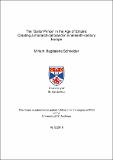The "sailor prince" in the age of empire : creating a monarchical brand in nineteenth-century Europe
Abstract
This study examines the systemic function and public role of “Sailor Princes” within the
context of the nineteenth-century revival of monarchy. It explores how, between 1850 and
1914, the reigning families of Britain, Denmark, Germany and Greece chose to educate
their younger sons in the navy and thereby created powerful links with a mythically
invested symbol of national identity and modernity, of bourgeois virtue, imperial
integration and exotic adventure. All four countries perceived themselves as maritime
powers defined by their long seafaring traditions and/or great hopes for a naval future, by
their possession of (in)formal seaborne colonial empires and/or by their substantial
imperial ambitions. By latching onto the prominent trend of the nineteenth-century lure of
the sea and of naval enthusiasm, the dynasties of Saxe-Coburg, Glücksborg and
Hohenzollern were able to adapt these mental geographies for their own purposes and thus
to generate an appealing brand image for the emerging political mass market. Prince
Alfred of Britain (1844-1900), Prince Heinrich of Prussia (1862-1929), Prince Valdemar
of Denmark (1858-1939) and Prince Georgios of Greece (1869-1957) all became
powerful personality brands of their respective monarchies. This study investigates the
mechanisms and the agents responsible for their success. It examines the role of the sea
and of maritime imageries in nineteenth-century national identities; the myths and realities
of naval education and naval professionalism; the processes by which seaborne colonial
empires and diaspora communities were integrated into larger imperial units and
represented to each other via interimperial diplomacy; as well as the public reception,
appropriation and recreation of the “Sailor Prince” brand in various popular media, e.g. family magazines, adventure fiction and consumer goods.
Type
Thesis, PhD Doctor of Philosophy
Collections
Items in the St Andrews Research Repository are protected by copyright, with all rights reserved, unless otherwise indicated.

